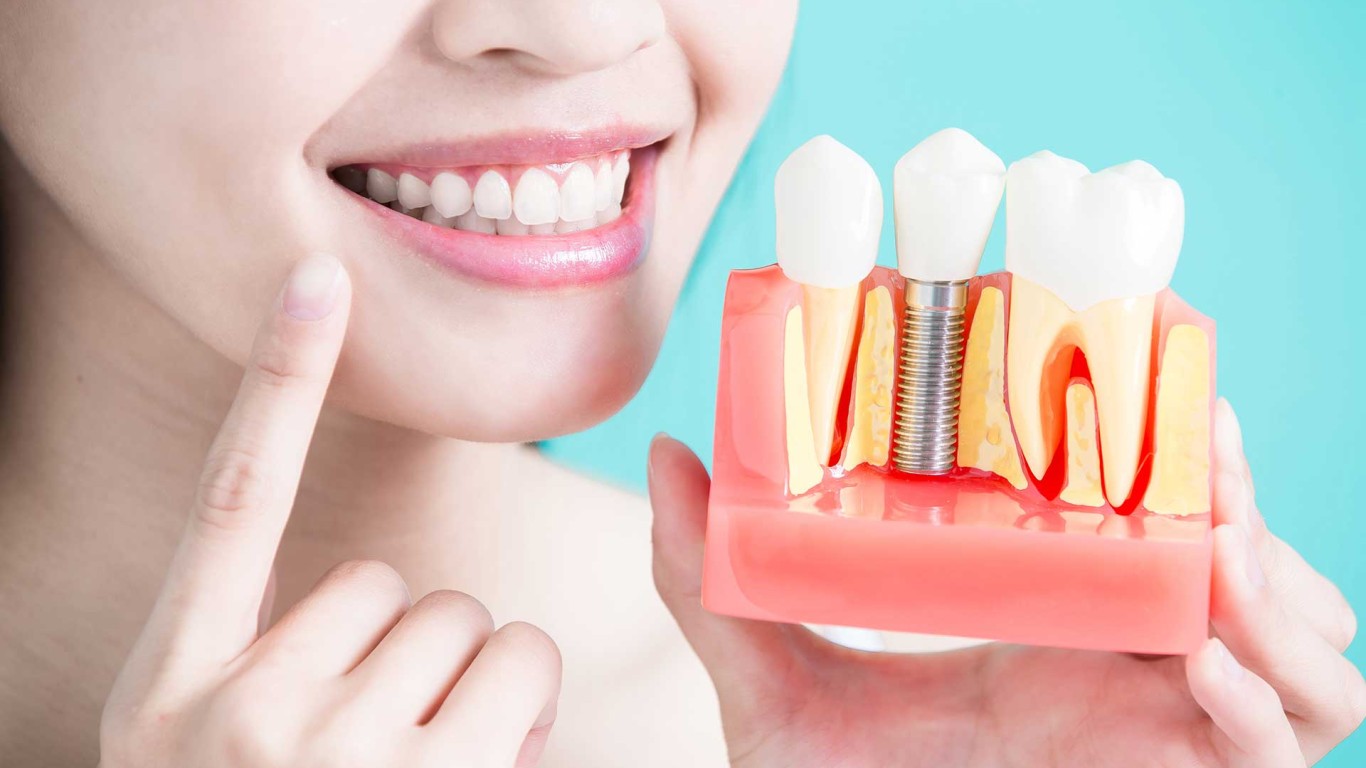When choosing between dental implants and dentures, it’s important to weigh comfort, longevity and function. Both options can restore your smile. But the experience and outcome differ significantly. Understanding these differences helps patients make informed decisions about long-term dental solutions. In this article, we compare both methods. This will help you decide which fits your needs and lifestyle best.
Understanding Dental Implants
Dental implants are titanium posts inserted into the jawbone to support replacement teeth. They mimic the function of natural roots. Over time, they fuse with the bone through a process called osseointegration. This creates a stable foundation for crowns, bridges or dentures. Additionally, implants preserve bone density. When teeth are missing, the jawbone can shrink. Implants stimulate the bone, preventing this loss. This feature makes them an excellent long-term solution for many patients. Although the process takes longer, the results are permanent and feel very natural. Once placed, implants look, function and feel like your original teeth.
Understanding Dentures
Dentures are removable appliances that replace missing teeth. They can be full (all teeth) or partial (some teeth). Unlike dental implants, dentures rest on the gums and are not anchored to bone. Dentures are usually quicker and less invasive to fit. They're often recommended for people who may not be candidates for surgery. Modern dentures have improved in fit and appearance, but they still require daily removal and cleaning. Because they don’t fuse with the bone, dentures cannot stop bone loss. Over time, changes in the jaw may require adjustments or replacements to maintain a good fit.
Comfort and Fit Comparison
Dental implants offer superior comfort compared to dentures. They become part of your mouth and stay fixed in place. You can eat, laugh and speak confidently without concern about movement. Dentures, although customised, may feel bulky at first. They can cause pressure points or sore spots. Adhesives are often required to keep them in place, which some patients find inconvenient. Furthermore, implants don’t affect your sense of taste or oral temperature, which can sometimes occur with dentures due to coverage of the palate.
Appearance and Natural Feel
Both options aim to restore your smile, but implants offer a more natural look and feel. Because they're embedded in the bone, they replicate how natural teeth emerge from the gums. This also helps maintain the face’s shape over time. Dentures can also look natural, especially high-quality custom ones. However, they may not provide the same realism during close interactions. Some patients report a feeling of looseness or artificiality when speaking or chewing. Moreover, dentures may require adjustments as your jawbone changes, while implants are fixed and permanent.

Maintenance and Care Needs
Implants require care similar to natural teeth. Regular brushing, flossing and dental check-ups are key to longevity. Once healed, they are relatively low maintenance. Dentures need to be removed and cleaned daily. You should soak them overnight to maintain hygiene and shape. Improper care can lead to odours, infections or gum irritation. Although maintenance differs, both require commitment to oral hygiene. Neglecting care can lead to complications or replacement needs over time.
Functionality and Eating Experience
One of the main benefits of dental implants is that they restore nearly full chewing ability. You can eat all types of food without worry. This includes crunchy fruits, tough meats and sticky treats. Dentures can limit your food choices, especially harder or chewier items. They may shift during eating, affecting your confidence. Additionally, certain foods may need to be cut into smaller pieces or avoided altogether. If diet quality and unrestricted eating are priorities for you, implants are clearly superior.
Dental Implants or Dentures: Longevity and Durability
Dental implants are designed to last decades, often a lifetime with proper care. They are resistant to decay and are made from durable materials. The crown may eventually need replacement, but the titanium post usually remains intact. Dentures typically last 5 to 10 years before needing a new set. Changes in your gums and jaw affect their fit over time. Even with excellent care, they wear down faster than implants. Therefore, if you’re looking for a long-term solution, dental implants offer greater durability and consistency.
Dental Implants or Dentures: Cost and Financial Considerations
Dentures usually cost less upfront than implants. They’re often seen as the more affordable solution, especially for full arch replacement. However, implants, though costlier initially, may prove more economical long term. They don't require frequent replacements or adjustments. They also prevent bone loss, potentially reducing the need for future corrective treatments. Moreover, many clinics now offer flexible financing options for implants, making them more accessible than before.
Dental Implants or Dentures: Procedure Timeline and Recovery
Getting dental implants is a longer process. It can take several months due to healing and integration periods. However, it is a one-time procedure with lasting results. Dentures can be fitted in weeks. For patients needing fast restoration, this may be an advantage. However, they may require future visits for fit corrections, relining or replacements. Additionally, the surgical aspect of implants means recovery involves more downtime upfront. But once healed, they are worry-free compared to removable alternatives.
Suitability and Personal Factors
Not everyone is a candidate for implants. Good bone density, healthy gums and general wellness are essential. However, bone grafting options can help certain patients qualify. Dentures are suitable for a broader range of individuals. They're often the go-to option for older adults or those avoiding surgery. Your dentist can guide you based on your health, budget and aesthetic goals. Furthermore, your personal preferences play a role. Some patients prioritise convenience and appearance, while others focus on affordability.
Conclusion
Choosing between dental implants and dentures depends on your lifestyle, budget and long-term expectations. Implants offer a permanent, natural-feeling solution that maintains bone and function. Dentures, while more accessible, require ongoing care and may lack the same stability. Discuss your options with a dental specialist to make the right choice. For more information on dental procedures and to book a consultation visit the ACIBADEM Beauty Center Dental Procedure webpage.
Frequently Asked Questions
Most patients experience minimal discomfort. Anaesthesia and post-operative care ensure a manageable recovery.
With proper care, implants can last over 25 years or even a lifetime.
Yes, but some foods may be harder to chew, especially crunchy or sticky items.
Yes. Implants help prevent bone loss by stimulating the jawbone, unlike dentures.
A consultation with your dentist will evaluate your health, bone density and lifestyle needs.














